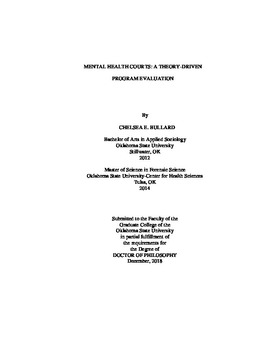| dc.contributor.advisor | Sittner Hartshorn, Kelley J. | |
| dc.contributor.author | Bullard, Chelsea Elizabeth | |
| dc.date.accessioned | 2019-07-19T13:33:36Z | |
| dc.date.available | 2019-07-19T13:33:36Z | |
| dc.date.issued | 2018-12-01 | |
| dc.identifier.uri | https://hdl.handle.net/11244/320943 | |
| dc.description.abstract | Mental Health Courts (MHCs) represent a potential solution to the interconnected social issues of mass incarceration and the criminalization of mental illness. MHC programs remove mentally ill offenders from regular judicial processes and into community-based therapeutic treatment. | |
| dc.description.abstract | The purpose of this research is to evaluate current MHC practices, organization, and environments to uncover variations in program assumptions and determine to what extent and manner MHCs adhere to the 10 Essential Elements of Mental Health Courts (Thompson, Osher and Tomasini-Joshi 2008). The research uses a mixed-methods study design within a program-theory framework using a survey and a collection of relevant MHC documents. Data was analyzed utilizing descriptive statistics and content analysis for a sample of twenty-seven adult MHC programs from eighteen states. Results were used to create program-theory logic models, identify issues, offer insights into the possibility of novel Essential Elements, and suggest new evaluation questions and methods for future research. | |
| dc.description.abstract | The research revealed six key findings: 1. MHCs are largely experiencing expansion from predominate emphasis on meeting clinical treatment needs to inclusion of a variety of services/activities aimed to meet identified dynamic criminogenic needs, 2. MHCs do not place as much emphasis on sanctions and incentives as an intervention required for program success as originally assumed, 3. Despite identified evolution in program assumptions and expanded variety of program activities, MHC goals are largely the same as originally outlined in the Essential Elements, 4. Client transportation acts as major barrier to program success, 5. The 10 Essential Elements continue to largely encompass what court teams assume makes a successful MHC, restorative justice, however, may merit future consideration for inclusion, and 6. MHCs largely feel their programs impact the level of social organization in their communities, thus, community-level impacts are a viable source for methodological pursuit in future program evaluation. | |
| dc.description.abstract | This research is significant because it outlines a new method of MHC evaluation. Proper evaluation of the impacts of MHCs is imperative because MHCs have the capacity to promote access to care, diminish fear and stigmatization of the mentally ill, and reduce societal burdens caused by the criminalization of the mentally ill. | |
| dc.format | application/pdf | |
| dc.language | en_US | |
| dc.rights | Copyright is held by the author who has granted the Oklahoma State University Library the non-exclusive right to share this material in its institutional repository. Contact Digital Library Services at lib-dls@okstate.edu or 405-744-9161 for the permission policy on the use, reproduction or distribution of this material. | |
| dc.title | Mental Health Courts: A Theory-Driven Program Evaluation | |
| dc.contributor.committeeMember | Liang, Bin | |
| dc.contributor.committeeMember | Whitham, Monica | |
| dc.contributor.committeeMember | Thrasher, Ronald R. | |
| osu.filename | Bullard_okstate_0664D_16015.pdf | |
| osu.accesstype | Open Access | |
| dc.description.department | Sociology | |
| dc.type.genre | Dissertation | |
| dc.type.material | Text | |
